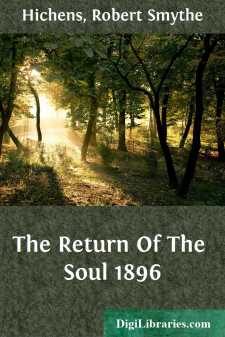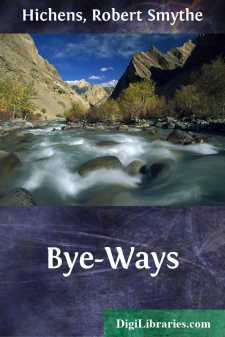Categories
- Antiques & Collectibles 13
- Architecture 36
- Art 48
- Bibles 22
- Biography & Autobiography 813
- Body, Mind & Spirit 142
- Business & Economics 28
- Children's Books 17
- Children's Fiction 14
- Computers 4
- Cooking 94
- Crafts & Hobbies 4
- Drama 346
- Education 46
- Family & Relationships 57
- Fiction 11829
- Games 19
- Gardening 17
- Health & Fitness 34
- History 1377
- House & Home 1
- Humor 147
- Juvenile Fiction 1873
- Juvenile Nonfiction 202
- Language Arts & Disciplines 88
- Law 16
- Literary Collections 686
- Literary Criticism 179
- Mathematics 13
- Medical 41
- Music 40
- Nature 179
- Non-Classifiable 1768
- Performing Arts 7
- Periodicals 1453
- Philosophy 64
- Photography 2
- Poetry 896
- Political Science 203
- Psychology 42
- Reference 154
- Religion 513
- Science 126
- Self-Help 84
- Social Science 81
- Sports & Recreation 34
- Study Aids 3
- Technology & Engineering 59
- Transportation 23
- Travel 463
- True Crime 29
Robert Smythe Hichens
Robert Smythe Hichens (1864-1950) was an English novelist, journalist, and music critic, best known for his satirical and supernatural fiction. His novel "The Green Carnation" (1894) gained notoriety for its thinly veiled depiction of the relationship between Oscar Wilde and Lord Alfred Douglas. Hichens' works often explore themes of decadence and the occult, with "The Garden of Allah" (1904) being one of his most successful novels, adapted into several films.
Author's Books:
Sort by:
CHAPTER I MRS. MERILLIA IS CARRIED TO BED The great telescope of the Prophet was carefully adjusted upon its lofty, brass-bound stand in the bow window of Number One Thousand Berkeley Square. It pointed towards the remarkably bright stars which twinkled in the December sky over frosty London, those guardian stars which always seemed to the Prophet to watch with peculiar solicitude over the most...
more...
Tuesday Night, November 3rd. Theories! What is the good of theories? They are the scourges that lash our minds in modern days, lash them into confusion, perplexity, despair. I have never been troubled by them before. Why should I be troubled by them now? And the absurdity of Professor Black's is surely obvious. A child would laugh at it. Yes, a child! I have never been a diary writer. I have never...
more...
On a dreary afternoon of November, when London was closely wrapped in a yellow fog, Hermione Lester was sitting by the fire in her house in Eaton Place reading a bundle of letters, which she had just taken out of her writing-table drawer. She was expecting a visit from the writer of the letters, Emile Artois, who had wired to her on the previous day that he was coming over from Paris by the night train...
more...
THE PYRAMIDS Why do you come to Egypt? Do you come to gain a dream, or to regain lost dreams of old; to gild your life with the drowsy gold of romance, to lose a creeping sorrow, to forget that too many of your hours are sullen, grey, bereft? What do you wish of Egypt? The Sphinx will not ask you, will not care. The Pyramids, lifting their unnumbered stones to the clear and wonderful skies, have held,...
more...
I Doctor Meyer Isaacson had got on as only a modern Jew whose home is London can get on, with a rapidity that was alarming. He seemed to have arrived as a bullet arrives in a body. He was not in the heart of success, and lo! he was in the heart of success. And no one had marked his journey. Suddenly every one was speaking of him—was talking of the cures he had made, was advising every one else to go...
more...
Some men deliberately don a character in early youth as others don a mask before going to an opera ball. They select it not without some care, being guided in their choice by the opinion they have formed of the world's mind and manner of proceeding. In the privacy of the dressing-room, the candles being lighted and the mirror adjusted at the best angle for a view of self, they assume their...
more...
THE CHARMER OF SNAKES I The petulant whining of the jackals prevented Renfrew from sleeping. At first he lay still on his camp bed, staring at the orifice of the bell tent, which was only partially covered by the canvas flap let down by Mohammed, after he had bidden his master good-night. Behind the tent the fettered mules stamped on the rough, dry ground, and now and then the heavy rustling of a wild...
more...
He slipped a green carnation into his evening coat, fixed it in its place with a pin, and looked at himself in the glass, the long glass that stood near the window of his London bedroom. The summer evening was so bright that he could see his double clearly, even though it was just upon seven o'clock. There he stood in his favourite and most characteristic attitude, with his left knee slightly...
more...
CHAPTER I Alick Craven, who was something in the Foreign Office, had been living in London, except for an interval of military service during the war, for several years, and had plenty of interesting friends and acquaintances, when one autumn day, in a club, Frances Braybrooke, who knew everybody, sat down beside him and began, as his way was, talking of people. Braybrooke talked well and was an...
more...
CHAPTER I "We want a new note in English music," said Charmian, in her clear and slightly authoritative voice. "The Hallelujah Chorus era has gone at last to join all the Victorian relics. And the nation is drifting musically. Of course we have a few composers who are being silly in the attempt to be original, and a few others who still believe that all the people can stand in the way of...
more...











